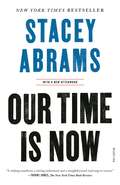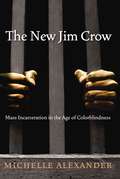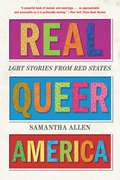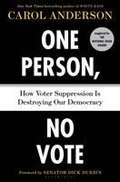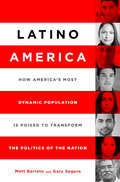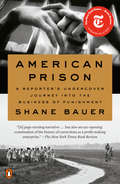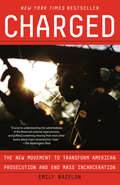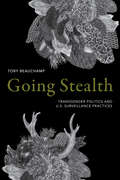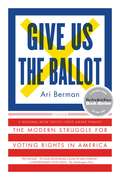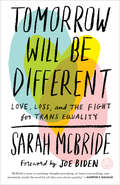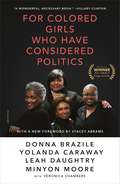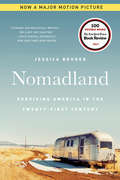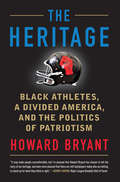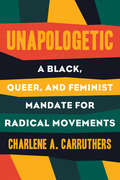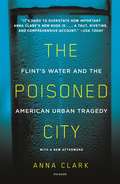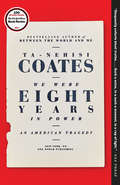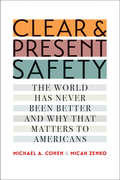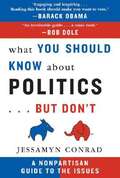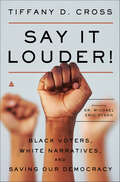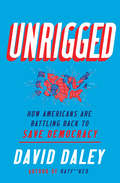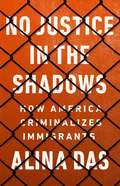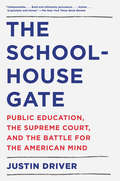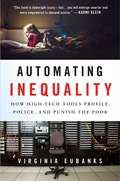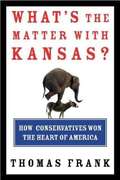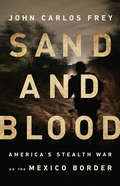Special Collections
NYPL's 2020 Election Reading List
Description: The books on this list cover voting issues including healthcare, education, climate change, and foreign policy, and explore subjects including political polarization, the media, and movements toward greater justice and equity.
- Table View
- List View
Our Time Is Now
by Stacey AbramsNEW YORK TIMES BESTSELLER"With each page, she inspires and empowers us to create systems that reflect a world in which all voices are heard and all people believe and feel that they matter." —Kerry Washington "This is a narrative that describes the urgency that compels me and millions more to push for a different American story than the one being told today. It's a story that is one part danger, one part action, and all true. It's a story about how and why we fight for our democracy and win." —Stacey Abrams Celebrated national leader and bestselling author Stacey Abrams offers a blueprint to end voter suppression, empower our citizens, and take back our country. A recognized expert on fair voting and civic engagement, Abrams chronicles a chilling account of how the right to vote and the principle of democracy have been and continue to be under attack. Abrams would have been the first African American woman governor, but experienced these effects firsthand, despite running the most innovative race in modern politics as the Democratic nominee in Georgia. Abrams didn’t win, but she has not conceded. The book compellingly argues for the importance of robust voter protections, an elevation of identity politics, engagement in the census, and a return to moral international leadership. Our Time Is Now draws on extensive research from national organizations and renowned scholars, as well as anecdotes from her life and others’ who have fought throughout our country’s history for the power to be heard. The stakes could not be higher. Here are concrete solutions and inspiration to stand up for who we are—now.
The New Jim Crow
by Michelle AlexanderAs the United States celebrates the nation's "triumph over race" with the election of Barack Obama, the majority of young black men in major American cities are locked behind bars or have been labeled felons for life. Although Jim Crow laws have been wiped off the books, an astounding percentage of the African American community remains trapped in a subordinate status--much like their grandparents before them.In this incisive critique, former litigator-turned-legal-scholar Michelle Alexander provocatively argues that we have not ended racial caste in America: we have simply redesigned it. Alexander shows that, by targeting black men and decimating communities of color, the U.S. criminal justice system functions as a contemporary system of racial control, even as it formally adheres to the principle of color blindness. The New Jim Crow challenges the civil rights community--and all of us--to place mass incarceration at the forefront of a new movement for racial justice in America.
Real Queer America
by Samantha AllenA transgender reporter's narrative tour through the surprisingly vibrant queer communities sprouting up in red states, offering a vision of a stronger, more humane America.
Ten years ago, Samantha Allen was a suit-and-tie-wearing Mormon missionary. Now she's a senior Daily Beast reporter happily married to another woman. A lot in her life has changed, but what hasn't changed is her deep love of Red State America, and of queer people who stay in so-called "flyover country" rather than moving to the liberal coasts. In Real Queer America, Allen takes us on a cross-country road-trip stretching all the way from Provo, Utah to the Rio Grande Valley to the Bible Belt to the Deep South. Her motto for the trip: "Something gay every day." Making pit stops at drag shows, political rallies, and hubs of queer life across the heartland, she introduces us to scores of extraordinary LGBT people working for change, from the first openly transgender mayor in Texas history to the manager of the only queer night club in Bloomington, Indiana, and many more.
Capturing profound cultural shifts underway in unexpected places and revealing a national network of chosen family fighting for a better world, Real Queer America is a treasure trove of uplifting stories and a much-needed source of hope and inspiration in these divided times.
One Person, No Vote
by Carol AndersonIn her New York Times bestseller White Rage, Carol Anderson laid bare an insidious history of policies that have systematically impeded black progress in America, from 1865 to our combustible present. With One Person, No Vote, she chronicles a related history: the rollbacks to African American participation in the vote since the 2013 Supreme Court decision that eviscerated the Voting Rights Act of 1965. Known as the Shelby ruling, this decision effectively allowed districts with a demonstrated history of racial discrimination to change voting requirements without approval from the Department of Justice.
Focusing on the aftermath of Shelby, Anderson follows the astonishing story of government-dictated racial discrimination unfolding before our very eyes as more and more states adopt voter suppression laws. In gripping, enlightening detail she explains how voter suppression works, from photo ID requirements to gerrymandering to poll closures. In a powerful new afterword, she examines the repercussions of the 2018 midterm elections. And with vivid characters, she explores the resistance: the organizing, activism, and court battles to restore the basic right to vote to all Americans.
Latino America
by Gary M. Segura and Matt BarretoSometime in April 2014, somewhere in a hospital in California, a Latino child tipped the demographic scales as Latinos displaced non-Hispanic whites as the largest racial/ethnic group in the state. So, one-hundred-sixty-six years after the Treaty of Guadalupe Hidalgo brought the Mexican province of Alta California into the United States, Latinos once again became the largest population in the state. Surprised? Texas will make the same transition sometime before 2020.When that happens, America's two most populous states, carrying the largest number of Electoral College votes, will be Latino. New Mexico is already there. New York, Florida, Arizona, and Nevada are shifting rapidly. Latino populations since 2000 have doubled in Alabama, Arkansas, Georgia, and South Dakota. The US is undergoing a substantial and irreversible shift in its identity.So, too, are the Latinos who make up these populations. Matt Barreto and Gary M. Segura are the country's preeminent experts in the shape, disposition, and mood of Latino America. They show the extent to which Latinos have already transformed the US politically and socially, and how Latino Americans are the most buoyant and dynamic ethnic and racial group, often in quite counterintuitive ways. Latinos' optimism, strength of family, belief in the constructive role of government, and resilience have the imminent potential to reshape the political and partisan landscape for a generation and drive the outcome of elections as soon as 2016.
American Prison
by Shane BauerA ground-breaking and brave inside reckoning with the nexus of prison and profit in America: in one Louisiana prison and over the course of our country's history.
In 2014, Shane Bauer was hired for $9 an hour to work as an entry-level prison guard at a private prison in Winnfield, Louisiana. An award-winning investigative journalist, he used his real name; there was no meaningful background check. Four months later, his employment came to an abrupt end. But he had seen enough, and in short order he wrote an exposé about his experiences that won a National Magazine Award and became the most-read feature in the history of the magazine Mother Jones. Still, there was much more that he needed to say.
In American Prison, Bauer weaves a much deeper reckoning with his experiences together with a thoroughly researched history of for-profit prisons in America from their origins in the decades before the Civil War. For, as he soon realized, we can't understand the cruelty of our current system and its place in the larger story of mass incarceration without understanding where it came from. Private prisons became entrenched in the South as part of a systemic effort to keep the African-American labor force in place in the aftermath of slavery, and the echoes of these shameful origins are with us still.
The private prison system is deliberately unaccountable to public scrutiny. Private prisons are not incentivized to tend to the health of their inmates, or to feed them well, or to attract and retain a highly-trained prison staff. Though Bauer befriends some of his colleagues and sympathizes with their plight, the chronic dysfunction of their lives only adds to the prison's sense of chaos. To his horror, Bauer finds himself becoming crueler and more aggressive the longer he works in the prison, and he is far from alone.
A blistering indictment of the private prison system, and the powerful forces that drive it, American Prison is a necessary human document about the true face of justice in America.
Charged
by Emily BazelonA renowned journalist and legal commentator exposes the unchecked power of the prosecutor as a driving force in America’s mass incarceration crisis—and charts a way out.
The American criminal justice system is supposed to be a contest between two equal adversaries, the prosecution and the defense, with judges ensuring a fair fight.
That image of the law does not match the reality in the courtroom, however. Much of the time, it is prosecutors more than judges who control the outcome of a case, from choosing the charge to setting bail to determining the plea bargain. They often decide who goes free and who goes to prison, even who lives and who dies.
In Charged, Emily Bazelon reveals how this kind of unchecked power is the underreported cause of enormous injustice—and the missing piece in the mass incarceration puzzle.
Charged follows the story of two young people caught up in the criminal justice system: Kevin, a twenty-year-old in Brooklyn who picked up his friend’s gun as the cops burst in and was charged with a serious violent felony, and Noura, a teenage girl in Memphis indicted for the murder of her mother.
Bazelon tracks both cases—from arrest and charging to trial and sentencing—and, with her trademark blend of deeply reported narrative, legal analysis, and investigative journalism, illustrates just how criminal prosecutions can go wrong and, more important, why they don’t have to.
Bazelon also details the second chances they prosecutors can extend, if they choose, to Kevin and Noura and so many others.
She follows a wave of reform-minded D.A.s who have been elected in some of our biggest cities, as well as in rural areas in every region of the country, put in office to do nothing less than reinvent how their job is done. If they succeed, they can point the country toward a different and profoundly better future.
A New York Times Bestseller
Going Stealth
by Toby BeauchampIn Going Stealth Toby Beauchamp demonstrates how the enforcement of gender conformity is linked to state surveillance practices that identify threats based on racial, gender, national, and ableist categories of difference. Positioning surveillance as central to our understanding of transgender politics, Beauchamp examines a range of issues, from bathroom bills and TSA screening practices to Chelsea Manning's trial, to show how security practices extend into the everyday aspects of our gendered lives. He brings the fields of disability, science and technology, and surveillance studies into conversation with transgender studies to show how the scrutinizing of gender nonconformity is motivated less by explicit transgender identities than by the perceived threat that gender nonconformity poses to the U.S. racial and security state. Beauchamp uses instances of gender surveillance to demonstrate how disciplinary power attempts to produce conformist citizens and regulate difference through discourses of security. At the same time, he contends that greater visibility and recognition for gender nonconformity, while sometimes beneficial, might actually enable the surveillance state to more effectively track, measure, and control trans bodies and identities.
Give Us The Ballot
by Ari BermanCountless books have been written about the civil rights movement, but far less attention has been paid to what happened after the dramatic passage of the Voting Rights Act in 1965 and the turbulent forces it unleashed. In this groundbreaking narrative history, Ari Berman charts both the transformation of American democracy under the VRA and the counterrevolution that has sought to limit it from the moment the act was signed into law. The VRA is widely regarded as the crowning achievement of the civil rights movement, and yet―more than fifty years later―the battles over race, representation, and political power continue, as lawmakers devise new strategies to keep minorities out of the voting booth, while the Supreme Court has declared a key part of the Voting Rights Act unconstitutional.
Through meticulous research, in-depth interviews, and incisive on-the-ground reporting, Give Us the Ballot offers the first comprehensive history of its kind, and provides new insight into one of the most vital political and civil rights issues of our time.
Tomorrow Will Be Different
by Joe Biden and Sarah McBrideBefore she became the first transgender person to speak at a national political convention in 2016 at the age of twenty-six, Sarah McBride struggled with the decision to come out—not just to her family but to the students of American University, where she was serving as student body president. She’d known she was a girl from her earliest memories, but it wasn’t until the Facebook post announcing her truth went viral that she realized just how much impact her story could have on the country.
Four years later, McBride was one of the nation’s most prominent transgender activists, walking the halls of the White House, advocating inclusive legislation, and addressing the country in the midst of a heated presidential election. She had also found her first love and future husband, Andy, a trans man and fellow activist, who complemented her in every way . . . until cancer tragically intervened.
Informative, heartbreaking, and profoundly empowering, Tomorrow Will Be Different is McBride’s story of love and loss and a powerful entry point into the LGBTQ community’s battle for equal rights and what it means to be openly transgender. From issues like bathroom access to health care to gender in America, McBride weaves the important political and cultural milestones into a personal journey that will open hearts and change minds.
As McBride urges: “We must never be a country that says there’s only one way to love, only one way to look, and only one way to live.” The fight for equality and freedom has only just begun.
For Colored Girls Who Have Considered Politics
by Veronica Chambers and Donna Brazile and Yolanda Caraway and Leah Daughtry and Minyon MooreThe four most powerful African American women in politics share the story of their friendship and how it has changed politics in America.The lives of black women in American politics are remarkably absent from the shelves of bookstores and libraries. For Colored Girls Who Have Considered Politics is a sweeping view of American history from the vantage points of four women who have lived and worked behind the scenes in politics for over thirty years—Donna Brazile, Yolanda Caraway, Leah Daughtry, and Minyon Moore—a group of women who call themselves The Colored Girls. Like many people who have spent their careers in public service, they view their lives in four-year waves where presidential campaigns and elections have been common threads. For most of the Colored Girls, their story starts with Jesse Jackson’s first campaign for president. From there, they went on to work on the presidential campaigns of Walter Mondale, Michael Dukakis, Bill Clinton, Al Gore, Barack Obama and Hillary Rodham Clinton. Over the years, they’ve filled many roles: in the corporate world, on campaigns, in unions, in churches, in their own businesses and in the White House. Through all of this, they’ve worked with those who have shaped our country’s history—US Presidents such as Bill Clinton and Barack Obama, well-known political figures such as Terry McAuliffe and Howard Dean, and legendary activists and historical figures such as Jesse Jackson, Coretta Scott King, and Betty Shabazz. For Colored Girls Who Have Considered Politics is filled with personal stories that bring to life heroic figures we all know and introduce us to some of those who’ve worked behind the scenes but are still hidden. Whatever their perch, the Colored Girls are always focused on the larger goal of “hurrying history” so that every American — regardless of race, gender or religious background — can have a seat at the table. This is their story.
Nomadland
by Jessica BruderThe end of retirement?
From the beet fields of North Dakota to the National Forest campgrounds of California to Amazon’s CamperForce program in Texas, employers have discovered a new, low-cost labor pool, made up largely of transient older Americans. Finding that social security comes up short, often underwater on mortgages, these invisible casualties of the Great Recession have taken to the road by the tens of thousands in late-model RVs, travel trailers, and vans, forming a growing community of nomads: migrant laborers who call themselves “workampers.”
On frequently traveled routes between seasonal jobs, Jessica Bruder meets people from all walks of life: a former professor, a McDonald’s vice president, a minister, a college administrator, and a motorcycle cop, among many others—including her irrepressible protagonist, a onetime cocktail waitress, Home Depot clerk, and general contractor named Linda May.
In a secondhand vehicle she christens “Van Halen,” Bruder hits the road to get to know her subjects more intimately. Accompanying Linda May and others from campground toilet cleaning to warehouse product scanning to desert reunions, then moving on to the dangerous work of beet harvesting, Bruder tells a compelling, eye-opening tale of the dark underbelly of the American economy—one that foreshadows the precarious future that may await many more of us. At the same time, she celebrates the exceptional resilience and creativity of these quintessential Americans who have given up ordinary rootedness to survive. Like Linda May, who dreams of finding land on which to build her own sustainable “Earthship” home, they have not given up hope.
A New York Times Bestseller
The Heritage
by Howard BryantFollowing in the footsteps of Robeson, Ali, Robinson and others, today's Black athletes re-engage with social issues and the meaning of American patriotism
It used to be that politics and sports were as separate from one another as church and state. The ballfield was an escape from the world's worst problems, top athletes were treated like heroes, and cheering for the home team was as easy and innocent as hot dogs and beer. “No news on the sports page” was a governing principle in newsrooms.
That was then.
Today, sports arenas have been transformed into staging grounds for American patriotism and the hero worship of law enforcement. Teams wear camouflage jerseys to honor those who serve; police officers throw out first pitches; soldiers surprise their families with homecomings at halftime.
Sports and politics are decidedly entwined.But as journalist Howard Bryant reveals, this has always been more complicated for black athletes, who from the start, were committing a political act simply by being on the field. In fact, among all black employees in twentieth-century America, perhaps no other group had more outsized influence and power than ballplayers. The immense social responsibilities that came with the role is part of the black athletic heritage.
It is a heritage built by the influence of the superstardom and radical politics of Paul Robeson, Jackie Robinson, Muhammad Ali, Tommie Smith, and John Carlos through the 1960s; undermined by apolitical, corporate-friendly “transcenders of race,” O. J. Simpson, Michael Jordan, and Tiger Woods in the following decades; and reclaimed today by the likes of LeBron James, Colin Kaepernick, and Carmelo Anthony.The Heritage is the story of the rise, fall, and fervent return of the athlete-activist.
Through deep research and interviews with some of sports' best-known stars—including Kaepernick, David Ortiz, Charles Barkley, and Chris Webber—as well as members of law enforcement and the military, Bryant details the collision of post-9/11 sports in America and the politically engaged post-Ferguson black athlete.
Unapologetic
by Charlene CarruthersA manifesto from one of America's most influential activists which disrupts political, economic, and social norms by reimagining the Black Radical Tradition.
Drawing on Black intellectual and grassroots organizing traditions, including the Haitian Revolution, the US civil rights movement, and LGBTQ rights and feminist movements, Unapologetic challenges all of us engaged in the social justice struggle to make the movement for Black liberation more radical, more queer, and more feminist. This book provides a vision for how social justice movements can become sharper and more effective through principled struggle, healing justice, and leadership development. It also offers a flexible model of what deeply effective organizing can be, anchored in the Chicago model of activism, which features long-term commitment, cultural sensitivity, creative strategizing, and multiple cross-group alliances. And Unapologetic provides a clear framework for activists committed to building transformative power, encouraging young people to see themselves as visionaries and leaders.
The Poisoned City
by Anna ClarkWhen the people of Flint, Michigan, turned on their faucets in April 2014, the water pouring out was poisoned with lead and other toxins. Through a series of disastrous decisions, the state government had switched the city’s water supply to a source that corroded Flint’s aging lead pipes. Complaints about the foul-smelling water were dismissed: the residents of Flint, mostly poor and African American, were not seen as credible, even in matters of their own lives.It took eighteen months of activism by city residents and a band of dogged outsiders to force the state to admit that the water was poisonous. By that time, twelve people had died and Flint’s children had suffered irreparable harm. The long battle for accountability and a humane response to this man-made disaster has only just begun.In the first full account of this American tragedy, The Poisoned City recounts the gripping story of Flint’s poisoned water through the people who caused it, suffered from it, and exposed it. It is a chronicle of one town, but could also be about any American city, all made precarious by the neglect of infrastructure and the erosion of democratic decision making. Places like Flint are set up to fail—and for the people who live and work in them, the consequences can be fatal.
We Were Eight Years in Power
by Ta-Nehisi CoatesIn these “urgently relevant essays,”* the National Book Award–winning author of Between the World and Me “reflects on race, Barack Obama’s presidency and its jarring aftermath”*—including the election of Donald Trump.
“We were eight years in power” was the lament of Reconstruction-era black politicians as the American experiment in multiracial democracy ended with the return of white supremacist rule in the South. In this sweeping collection of new and selected essays, Ta-Nehisi Coates explores the tragic echoes of that history in our own time: the unprecedented election of a black president followed by a vicious backlash that fueled the election of the man Coates argues is America’s “first white president.”
But the story of these present-day eight years is not just about presidential politics. This book also examines the new voices, ideas, and movements for justice that emerged over this period—and the effects of the persistent, haunting shadow of our nation’s old and unreconciled history. Coates powerfully examines the events of the Obama era from his intimate and revealing perspective—the point of view of a young writer who begins the journey in an unemployment office in Harlem and ends it in the Oval Office, interviewing a president.
We Were Eight Years in Power features Coates’s iconic essays first published in The Atlantic, including “Fear of a Black President,” “The Case for Reparations,” and “The Black Family in the Age of Mass Incarceration,” along with eight fresh essays that revisit each year of the Obama administration through Coates’s own experiences, observations, and intellectual development, capped by a bracingly original assessment of the election that fully illuminated the tragedy of the Obama era. We Were Eight Years in Power is a vital account of modern America, from one of the definitive voices of this historic moment.
*Kirkus Reviews (starred review)
Praise for We Were Eight Years in Power:
“Essential . . . Coates’s probing essays about race, politics, and history became necessary ballast for this nation’s gravity-defying moment.” —The Boston Globe
“Coates’s always sharp commentary is particularly insightful as each day brings a new upset to the cultural and political landscape laid during the term of the nation’s first black president. . . . Coates is a crucial voice in the public discussion of race and equality, and readers will be eager for his take on where we stand now and why.” —Booklist
A New York Times Bestseller
Clear and Present Safety
by Micah Zenko and Michael A. CohenAn eye-opening look at the history of national security fear-mongering in America and how it distracts citizens from the issues that really matter What most frightens the average American? Terrorism. North Korea. Iran. But what if none of these are probable or consequential threats to America? What if the world today is safer, freer, wealthier, healthier, and better educated than ever before? What if the real dangers to Americans are noncommunicable diseases, gun violence, drug overdoses—even hospital infections? In this compelling look at what they call the “Threat‑Industrial Complex,” Michael A. Cohen and Micah Zenko explain why politicians, policy analysts, academics, and journalists are misleading Americans about foreign threats and ignoring more serious national security challenges at home. Cohen and Zenko argue that we should ignore Washington’s threat‑mongering and focus instead on furthering extraordinary global advances in human development and economic and political cooperation. At home, we should focus on that which actually harms us and undermines our quality of life: substandard schools and healthcare, inadequate infrastructure, gun violence, income inequality, and political paralysis.
What You Should Know about Politics... But Don't
by Jessamyn ConradThe author presents a voter's guide to the major national issues and debates being contested within mainstream two-party politics in the United States. She offers chapters on elections, the economy, foreign policy, the military, health care, energy, the environment, civil liberties, culture wars, socioeconomic policy, homeland security, education, and trade. Each chapter provides brief background before attending to current debates. Breadth of coverage is emphasized over depth and, with the exception of some footnotes, no guides to further reading are provided. Annotation ©2008 Book News, Inc., Portland, OR (booknews.com)
Say It Louder!
by Tiffany CrossA breakout media and political analyst delivers a sweeping snapshot of American Democracy and the role that African Americans have played in its shaping while offering concrete information to help harness the electoral power of the country’s rising majority and exposing political forces aligned to subvert and suppress Black voters.Black voters were critical to the Democrats’ 2018 blue wave. In fact, 90 percent of Black voters supported Democratic House candidates, compared to just 53 percent of all voters. Despite media narratives, this was not a fluke. Throughout U.S. history, Black people have played a crucial role in the shaping of the American experiment. Yet still, this powerful voting bloc is often dismissed as some “amorphous” deviation, argues Tiffany Cross.Say It Louder! is her explosive examination of how America’s composition was designed to exclude Black voters, but paradoxically would likely cease to exist without them. With multiple tentacles stretching into the cable news echo chamber, campaign leadership, and Black voter data, Cross creates a wrinkle in time with a reflective look at the timeless efforts endlessly attempting to deny people of color the right to vote—a basic tenet of American democracy. And yet as the demographics of the country are changing, so too is the electoral power construct—by evolution and by force, Cross declares. Grounded in the most-up-to-date research, Say It Louder! is a vital tool for a wide swath of constituencies.
Unrigged
by David DaleyA revelatory account by the best- selling author of Ratf**ked that will give you hope that America’s fragile democracy can still be saved. Following Ratf**ked, his “extraordinary timely and undeniably important” (New York Times Book Review) exposé of how a small cadre of Republican operatives rigged American elections, David Daley emerged as one of the nation’s leading authorities on gerrymandering. In Unrigged, he charts a vibrant political movement that is rising in the wake of his and other reporters’ revelations. With his trademark journalistic rigor and narrative flair, Daley reports on Pennsylvania’s dramatic defeat of a gerrymander using the research of ingenious mathematicians and the Michigan millennial who launched a statewide redistricting revolution with a Facebook post. He tells the stories of activist groups that paved the way for 2018’s historic blue wave and won crucial battles for voting rights in Florida, Maine, Utah, and nationwide. In an age of polarization, Unrigged offers a vivid portrait of a nation transformed by a new civic awakening, and provides a blueprint for what must be done to keep American democracy afloat.
No Justice in the Shadows
by Alina DasThis provocative account of our immigration system's long, racist history reveals how it has become the brutal machine that upends the lives of millions of immigrants today.Each year in the United States, hundreds of thousands of people are arrested, imprisoned, and deported, trapped in what leading immigrant rights activist and lawyer Alina Das calls the "deportation machine." The bulk of the arrests target people who have a criminal record -- so-called "criminal aliens" -- the majority of whose offenses are immigration-, drug-, or traffic-related. These individuals are uprooted and banished from their homes, their families, and their communities.Through the stories of those caught in the system, Das traces the ugly history of immigration policy to explain how the U.S. constructed the idea of the "criminal alien," effectively dividing immigrants into the categories "good" and "bad," "deserving" and "undeserving." As Das argues, we need to confront the cruelty of the machine so that we can build an inclusive immigration policy premised on human dignity and break the cycle once and for all.
The Schoolhouse Gate
by Justin DriverAn award-winning constitutional law scholar at the University of Chicago (who clerked for Judge Merrick B. Garland, Justice Stephen Breyer, and Justice Sandra Day O’Connor) gives us an engaging and alarming book that aims to vindicate the rights of public school students, which have so often been undermined by the Supreme Court in recent decades.
Judicial decisions assessing the constitutional rights of students in the nation’s public schools have consistently generated bitter controversy. From racial segregation to unauthorized immigration, from antiwar protests to compulsory flag salutes, from economic inequality to teacher-led prayer—these are but a few of the cultural anxieties dividing American society that the Supreme Court has addressed in elementary and secondary schools. The Schoolhouse Gate gives a fresh, lucid, and provocative account of the historic legal battles waged over education and illuminates contemporary disputes that continue to fracture the nation.
Justin Driver maintains that since the 1970s the Supreme Court has regularly abdicated its responsibility for protecting students’ constitutional rights and risked transforming public schools into Constitution-free zones. Students deriving lessons about citizenship from the Court’s decisions in recent decades would conclude that the following actions taken by educators pass constitutional muster: inflicting severe corporal punishment on students without any procedural protections, searching students and their possessions without probable cause in bids to uncover violations of school rules, random drug testing of students who are not suspected of wrongdoing, and suppressing student speech for the viewpoint it espouses.
Taking their cue from such decisions, lower courts have upheld a wide array of dubious school actions, including degrading strip searches, repressive dress codes, draconian “zero tolerance” disciplinary policies, and severe restrictions on off-campus speech.
Driver surveys this legal landscape with eloquence, highlights the gripping personal narratives behind landmark clashes, and warns that the repeated failure to honor students’ rights threatens our basic constitutional order. This magisterial book will make it impossible to view American schools—or America itself—in the same way again.
Automating Inequality
by Virginia EubanksThe State of Indiana denies one million applications for healthcare, foodstamps and cash benefits in three years—because a new computer system interprets any mistake as “failure to cooperate.” In Los Angeles, an algorithm calculates the comparative vulnerability of tens of thousands of homeless people in order to prioritize them for an inadequate pool of housing resources. In Pittsburgh, a child welfare agency uses a statistical model to try to predict which children might be future victims of abuse or neglect.
Since the dawn of the digital age, decision-making in finance, employment, politics, health and human services has undergone revolutionary change. Today, automated systems—rather than humans—control which neighborhoods get policed, which families attain needed resources, and who is investigated for fraud. While we all live under this new regime of data, the most invasive and punitive systems are aimed at the poor.
In Automating Inequality, Virginia Eubanks systematically investigates the impacts of data mining, policy algorithms, and predictive risk models on poor and working-class people in America. The book is full of heart-wrenching and eye-opening stories, from a woman in Indiana whose benefits are literally cut off as she lays dying to a family in Pennsylvania in daily fear of losing their daughter because they fit a certain statistical profile.
The U.S. has always used its most cutting-edge science and technology to contain, investigate, discipline and punish the destitute. Like the county poorhouse and scientific charity before them, digital tracking and automated decision-making hide poverty from the middle-class public and give the nation the ethical distance it needs to make inhumane choices: which families get food and which starve, who has housing and who remains homeless, and which families are broken up by the state. In the process, they weaken democracy and betray our most cherished national values.
This deeply researched and passionate book could not be more timely.
Sand and Blood
by John Carlos FreyA damning portrait of the U.S.-Mexico border, where militaristic fantasies are unleashed, violent technologies are tested, and immigrants are targeted.Over the past three decades, U.S. immigration and border security policies have turned the southern states into conflict zones, spawned a network of immigrant detention centers, and unleashed an army of ICE agents into cities across the country.As award-winning journalist John Carlos Frey reveals in this groundbreaking book, the war against immigrants has been escalating for decades, fueled by defense contractors and lobbyists seeking profits and politicians--Republicans and Democrats alike--who relied on racist fear-mongering to turn out votes. After 9/11, while Americans' attention was trained on the Middle East and the wars in Iraq and Afghanistan, the War on Terror was ramping up on our own soil--aimed not at terrorists but at economic migrants, refugees, and families from South and Central America seeking jobs, safety, and freedom in the U.S.But we are no safer. Instead, families are being ripped apart, undocumented people are living in fear, and thousands of migrants have died in detention or crossing the border.Taking readers to the Border Patrol outposts, unmarked graves, detention centers, and halls of power, Sand and Blood is a frightening, essential story we must not ignore.
